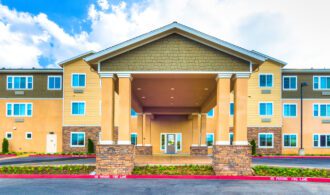Understanding Diabetes Management in Senior Living
As the population ages, there is a growing need for senior housing that meets the needs of an aging population. Many older adults are finding senior living communities to be a good option for them. The needs of older adults are different than that of younger adults, and senior housing offers amenities and services tailored to their unique circumstances.
Our communities at Generations provide residents with the services they need while allowing them the independence they want.
There are more than 20 million people over the age of 65 in the U.S., and that number is expected to double by 2030. Senior living communities offer an ideal way for these individuals to meet their needs without isolating themselves from others their own age.
In our National Diabetes Awareness post we want to highlight that the average lifespan has increased by almost 10 years since 1980, and according to the American Diabetes Association around one in four adults over the age of 65 has diabetes.
That means more people than ever are entering their golden years with pre-existing health conditions. That doesn’t mean they can’t live a long, happy life — but it does mean there needs to be a selection about senior care options.
Here are some ideas for managing diabetes for all to live a happier and healthier life for as long as possible.
To determine the level of care your loved one needs, at most Generation’s communities, we will provide support and guidance to our residents, for example at selected communities, our health care teams will use an evaluation tool to assess your loved one’s health, the severity of their diabetes, and how much care they will need.
A higher assessment score indicates the need for a more intensive diabetic care plan. For example, in some communities, a Level 1 care plan encompasses basic needs, such as help with activities of daily living (ADLs). As the levels of needed care increase, the plans become more specialized.
When evaluating communities for a loved one, remember to ask the community’s Sales Director or Health Services Director how they will work with you and your loved one to create a diabetes management plan. Upon review of the assessment the Health Services Director will be able to determine whether or not the community can meet the diabetic care needs of your loved one.
Ask specific questions to the Health Services Director or Executive Director about how the each community clinical team will met the needs of you or your loved one living with diabetes
Here are some initial questions to ask:
- What diabetes management education and training does the staff at Generations receive and how often?
- Does the community have a special focus on diabetes care and/or programs for individuals living with diabetes? Does the community offer diabetes support groups?
- What health care services does the community provide and how will staff coordinate care for health services not provided on site, such as physician visits?
Promoting healthy living
One of the biggest benefits of a senior living community at Generations is access to nutritious, well-balanced meals and physical activities that help keep diabetes symptoms at bay.
Fitness programs
The American Diabetes Association recommends 30 minutes of aerobic exercise five times a week and at least two sessions of strength training each week. Our communities have designated program directors or exercise coaches who customize fitness programs to fit the needs of individuals. Some of our communities may feature on-site amenities like a fitness center, swimming pool, golf course, or outdoor walking paths to encourage an active lifestyle.
Meal plans
Some of our senior living communities have a dietician or nutritionist on staff who can customize meal plans for seniors who have diabetes or other special dietary needs. These plans incorporate heart-healthy meals that keep saturated fats, sodium, and portions in check.
Many of our communities also offer flexible dining schedules and private room service, and these amenities may help ease the stress of a diet change.
When assessing how one of our communities may support a healthy lifestyle for your senior loved one, ask these questions:
- What activities are offered?
- What kinds of exercise facilities are available?
- Is there access to nature and walking paths?
- What are the meal policies and procedures for diabetic residents?
- Is there a dietician on staff?
- Are there meals available that are specifically designed for diabetic residents?
- What is the dining schedule, and is it flexible?
- Is room service available?
Talk with a Senior Living Community Sales Director
We help thousands of families each year find the right senior care for their loved ones.
Connect Now
Be sure to ask is about pricing and payment plans when determining your loved one’s care level, and ask the following questions:
- What will my loved one’s diabetes care cost?
- Does providing a special diet add to the cost? How much?
- Does glucose monitoring incur a cost?
- How will the cost change if my loved one’s level of care increases?
Every year at Generations, our communities come together to ring the alarm on the diabetes epidemic. For the millions of us who are at risk for it, it’s a time to get educated, find our resources and make sure all those around us are aware of their risk, too. And for the millions of us living with diabetes, it’s a chance to tell our stories and awaken the world. Until we find a cure, we will find each other and lift each other up.
Contact us today to learn more about being part of the Generations Communities, either for yourself or for your loved ones.

Here at Generations, we are helping residents build a gratitude practice.
Vitality, News & Resources, Attitude, benefitsofgratitude, gratitude, happiness, Thanksgiving, tips, wellness

Differences between Assisted and Independent Living.

We’ve compiled a list of the most important questions to ask.
Sources:
American Diabetes Association. “Caring for Community-Dwelling Older Adults with Diabetes: Perspectives from Health Care Providers and Caregivers.”
American Diabetes Association.“Management of Diabetes in Long-term Care and Skilled Nursing Facilities: A Position Statement of the American Diabetes Association.”
American Diabetes Association.“Living Healthy with Diabetes: A guide for adults 55 and up.”
American Geriatrics Society.“Diabetes Support Groups Improve Health Care of Older Diabetic Patients.”
Centers for Disease Control and Prevention.“5 Questions to Ask Your Health Care Team.”
Cleveland Clinic.“Diabetes: An Overview.”
Mayo Clinic.“Type 1 Diabetes.”
